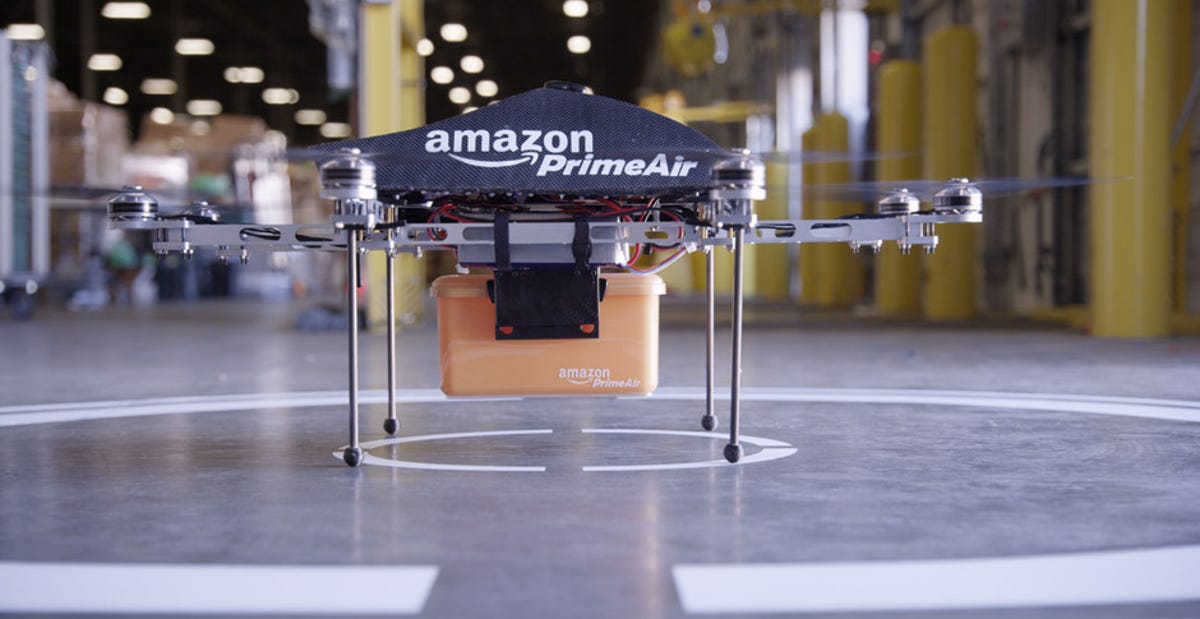
Amazon
Amazon is asking the federal government if it can start testing drones in its own backyard to speed up its development of Prime Air shipping, according to a letter published to the Federal Aviation Administration’s site on Thursday.
If granted, Amazon will be able to test its drones outside of the testing sites designated by the FAA. The Seattle-based company said it could innovate more quickly, allowing it to test out new designs without traveling to one of the six FAA-approved sites scattered throughout the country.
“We want to do more R&D (research and development) close to home,” VP of Global Public Policy Paul Misener said in a statement to CNET.
The Internet retail giant has been testing the technology in order to deliver small packages, weighing 5 pounds or less, by drones. In arguing the feasibility of what initially sounds like a bizarre stunt, Amazon said 86 percent of the products sold on its site weighs less than 5 pounds. CEO Jeff Bezos announced the Prime Air service in December, but it can’t take off until the FAA figures out how it will regulate unmanned aircrafts when they are used for commercial purposes. Currently, the FAA already regulates drone hobbyists.
The request for exemption included an update to Amazon’s drone progress in the last five months, including developing drone prototypes that can travel over 50 miles per hour while carrying a 5-pound package. The company also is testing two more iterations of the flying robots for things like agility, flight duration, and sensors for avoiding objects.
Related stories
- Amazon drones: Bold experiment or shrewd publicity stunt?
- Amazon delivery drones edge closer to reality
- Amazon testing ‘octocopter’ package-delivery drones
Amazon said it built a team — consisting of roboticists, scientists, aeronautical engineers, remote-sensing experts, and a former NASA astronaut — to test these drones at its private outdoor research and development operations near Seattle.
The company has been rapidly developing the drones. In a July 9 letter signed by Misener, he noted that Amazon is on its eighth- and ninth-generation models. Bezos said in a shareholder letter published in April that the company was testing its fifth- and sixth-generation drones.
The FAA allows entities to petition for an exemption from the rules if it can explain how it would benefit the public, and would not affect public safety. Once the agency processes the request, it will open it for public comments.
“One day, seeing Amazon Prime Air will be as normal as seeing mail trucks on the road today, resulting in enormous benefits for consumers across the nation,” reads the request.
The company outlined how it would maintain safety precautions while testing on site, including weight restrictions on the drones and testing conditions and controls.
Amazon said it would continue to hold tests at one or more of the designated sites, but wanted the exemption to speed along the prototyping process.
While drones are traditionally associated with military operations, the government is trying to figure out how these unmanned aerial vehicles will work in a civilian environment. In January, the FAA announced six testing sites that would help the agency determine guidelines for issues related to civilian drone operation, like safety, communications, navigation, air traffic control, and privacy. The sites chosen are the University of Alaska, the state of Nevada, Griffiss International Airport in New York, the North Dakota Department of Commerce, Texas A&M University’s Corpus Christi campus, and Virginia Polytechnic Institute.
In the past, the agency has not given a timeline for when it will have the regulations ready. But Bezos said previously that he doesn’t expect those regulations to be released until 2015. Bezos shocked consumers with the news of the delivery drones, made just before the holidays, in what many said was a publicity stunt aired on “60 Minutes.” But Amazon has clearly trudged ahead with its plans.
Last month, reports surfaced that the FAA effectively grounded Amazon’s ambitions by clarifying its stance on drones that deliver items for a fee. But the regulation only applies to drone hobbyists, not commercial entities like Amazon.



